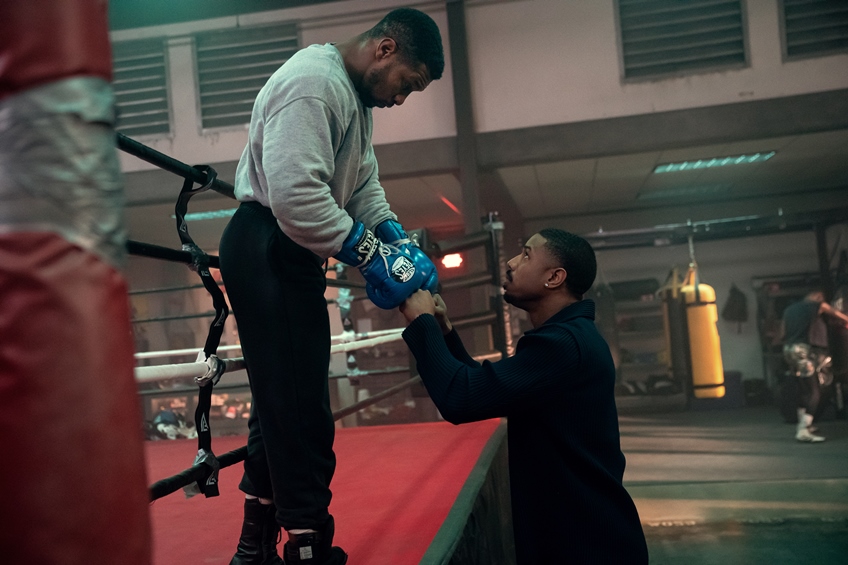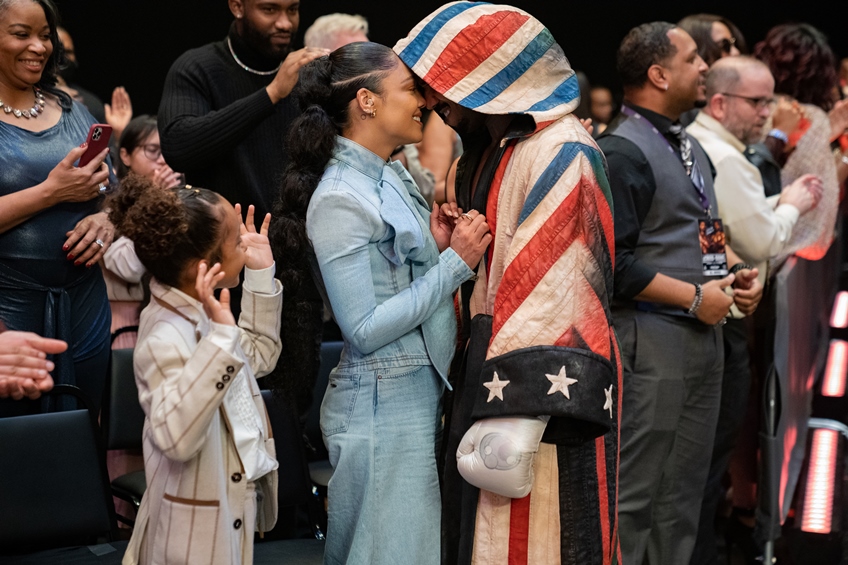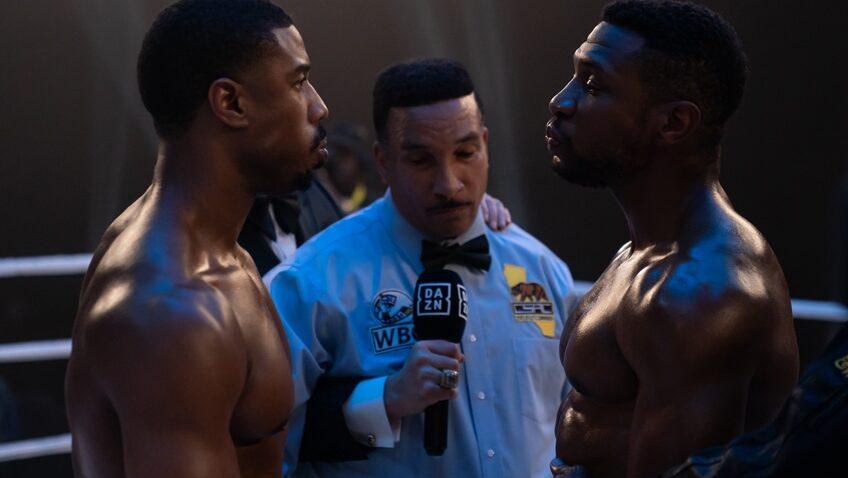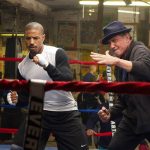Joyce Glasser reviews Creed III (March 3, 2023) Cert 12A, 116 mins.
What to make of a film that boasts two “firsts” and two of the hottest Black actors in the world today but can only drum up a sequential title, one that immediately puts it in its place? That place is number nine in a long line of boxing movies that began with Sylvester Stallone’s Rocky in 1976, switched from Rocky in the title to Creed in 2015, and looks set to continue with Creed for another two or three spin-offs. If you haven’t seen a Stallone movie since 1976, this probably isn’t for you.
For everyone else, a quick refresher. The story starts in 2013 with the biographical Fruitvale Station, a breakthrough film for director and co-writer Ryan Coogler and its rising star lead actor Michael B. Jordan. Two years later this formidable team was back with Creed, the first Rocky spin-off without Rocky in the title, although Stallone had a key on-screen role as Donnie Creed’s trainer. Jordan played Apollo Creed’s son Donnie who is eventually (the film charts this struggle) trained by Rocky Balboa, his deceased father’s former friend and rival. Rocky passes on the gloves.
Stallone may be the producer of Creed III but for the first time since 1976 he does not appear in the film. Coogler, who went on to co-write and direct the acclaimed blockbuster Black Panther, is no longer the director. In a cosmic leap of faith – and here is the second “first” – Jordan directs himself as the eponymous hero. Or, more interestingly, antihero. More on that in a minute.
For middleweight champion Adonis “Donnie” Creed (Jordan) life is good. He has retired on a high, and now runs Delphi Boxing Academy with Tony “Little Duke” Evers Jr., his former coach. Both men are coaching world champion Felix “El Guerrero” Chavez who is set to fight the villainous Viktor Drago.

The Academy is his second home. Real home is a huge, modern, well-equipped house overlooking Los Angeles, so high up it resembles Valhalla in a post Wagnerian cloud of smog. With him live his ever serene wife Bianca (Tessa Thompson), a former recording star, now an award winning producer due to a progressive hearing loss; their deaf daughter Amara (Mila Davis-Kent) with boxing aspirations, and, increasingly, Donnie’s adoptive mother Mary Anne Creed (Phylicia Rashad) who is on medication following a heart attack.
As in CODA, where deaf actor Troy Kotsur won an Academy Award as a signing dad, Donnie signs with his daughter who adores her daddy. And as in countless movies with mothers over 70 who have outlived their narrative purpose, Mary Anne, though looking terrific, succumbs to multiple organ failure. Her funeral does, however, open the story to a darker note that continues right up to the end.
And this darker note is referred to in an opening flashback to 2002 when teenage Donnie (Thaddeus J Mixon) sneaks out at night to watch his friend Damian “Dame” Anderson (Spence Moore II) complete in, and win, an underground boxing match. Damian confides in Donnie that he plans to turn pro. This expression of an aspiration cut short lies at the heart of the film.
Donnie and Damian stop at a liquor store and there Donnie encounters an abusive figure from their time together in an orphanage: Leon. Donnie begins to beat the older man. When we return to the flashback later in the film, we see that Damian is protecting his friend, or joining in on the revenge, with a gun.
And just when life is uncomplicated and sweet, and we think we are watching another Rocky/Creed boxing movie, Damian (the formidable Jonathan Majors, Ant-Man and the Wasp: Quantumania, The Last Black Man in San Francisco) re-enters Donnie’s life, awakening a mix of conflicting emotions in the wealthy champion that rattles him. Damian, who is skint, homeless and friendless, has just been released from 18 years in prison (he is, in the film, three years older than Donnie). All that, Donnie can handle with hand-outs and an invitation to dinner. But when Damian tells Donnie he wants to train at the Academy to have a shot at the championship, Donnie is being emotionally blackmailed. He decides to go out on a limb, angering Little Duke and compromising his protégé, Felix Chavez.
As anyone who has seen a few of the Rocky/Creed films knows, the challenge for the writers – Keenan Coogler and Zach Baylin (who wrote the witty script for the Academy Award nominated film King Richard) – is to come up with a worthy boxing opponent who, could, just could, take the title away from Rocky or, now, Creed.

This is by far the most novel opponent and not just because Donnie is retired. Donnie’s former best friend, beefed up on nothing more than long-simmering revenge, is in his late thirties, has no ranking, no management team, and no public profile. This is also the first boxing film that chooses to forget it’s a boxing film and turns, well, a bit Wagnerian.
If you ever thought the mafia-structured world of high stakes middle and heavy weight boxing was characterised by layers and layers of middle men, and money men, each protecting his or her turf and fighters, here, Donnie is drawn out of retirement by a phone call into the sports programme First Take. So we get the woefully familiar training routine (you know, jogging on the beach at dawn or midnight, weight lifting etc) and then an entourage-light fight in Dodger Stadium.
Jordan directs the fight scenes like the march of the Titans, so that we feel the punches. But since the fight has to go 12 rounds, half way through he cuts away from the crowds showing the action in a muted, slow-motion style that breaks the drama and the fourth wall. We think back to Valhalla. Here are two giants, or flawed gods, battling above an empty stadium not for prize money, but for the answer to the moral dilemma that no one wants to talk about.
When Donnie confides in Bianca – he didn’t even visit Damian in prison – she tells him to put the past behind him so he can enjoy his success and riches. Donnie is the hero because he knows that’s not the right answer. He’s the antihero because it takes him so long to realise it.
As for Creed IV and V? There are clues throughout the film, but none less subtle than the ending, who will carry on the Creed name: think Hilary Swank’s Oscar for playing a boxing champ. But Jonathan Majors is such a force to be reckoned with: upsetting the Hollywood applecart, much as “Diamond Dame” Anderson did the world of boxing, that he is sure to reappear.




